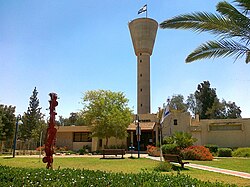Omer, Israel
Omer
|
||
|---|---|---|
| Hebrew transcription(s) | ||
| • ISO 259 | ʕomr | |
 |
||
|
||
| Coordinates: 31°15′51.48″N 34°50′48.9″E / 31.2643000°N 34.846917°ECoordinates: 31°15′51.48″N 34°50′48.9″E / 31.2643000°N 34.846917°E | ||
| District | Southern | |
| Government | ||
| • Type | Local council (from 1949) | |
| • Head of Municipality | Pini Badash | |
| Area | ||
| • Total | 20,126 dunams (20.1 km2 or 7.8 sq mi) | |
| Population (2015) | ||
| • Total | 7,339 | |
| Name meaning | Sheaf | |
Omer (Hebrew: עֹמֶר) is an upscale town in the Southern District of Israel, bordering Beersheba. It is located on Highway 60, between Beersheba and the Shoket Junction. In 2015 it had a population of 7,339.
Omer, originally known as Hevrona, was founded as a kibbutz in 1949. The early residents were demobilized Palmach soldiers. In 1951, it became a cooperative village known as Eilata. In 1953, it was re-established as a communal moshav by immigrants from Hungary and Romania and renamed Omer. The name is based on a verse from the book of Leviticus.
In 1957, residents of the ma'abarot in the vicinity moved to Omer. In 1962, it was renamed Tomer and became a neighborhood of Beersheba. Since 1974, it has been an independent town and suburb of Beersheba.
Pini Badash has served as mayor since 1990. Omer's jurisdiction is 20,126 dunams (~20.1 km²).
Omer is known for its high socio-economic ranking. It is one of three municipalities to score 10/10, along with Kokhav Yair and Savyon.
...
Wikipedia


